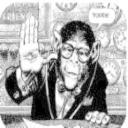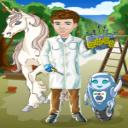Yahoo Answers is shutting down on May 4th, 2021 (Eastern Time) and beginning April 20th, 2021 (Eastern Time) the Yahoo Answers website will be in read-only mode. There will be no changes to other Yahoo properties or services, or your Yahoo account. You can find more information about the Yahoo Answers shutdown and how to download your data on this help page.
Trending News
Can humans create knowledge?
Someone told me before that the universe holds all potential knowledge, and we discover it, but what about the knowledge that we create?
Lets look at martial arts, at some point somebody created a martial art, now while that person is part of the universe, the individual created the art, did he therefore create knowledge?
you can obtain a pencil, that pencil had to be created at some point, knowledge, like anything else has to be created before it can be obtained
Adeikov
on the subject of creativity, does that mean we have created knowledge previously unknown to the individual?
9 Answers
- Anonymous1 decade agoFavorite Answer
Enterprise
What you are describing is not knowledge, but creativity, inventiveness, or resourcefulness, these are traits of a person. If there is knowledge in creativity, it is knowledge you learn through practice or experiment.
For instance, via experiment, I am sure martial art was developed.
Three words: Creativity, Experiment and Development
These three in one word: Enterprise
Of the additional information:
A pencil is a product of creativity inspired/shaped by purpose/need/function.
If you are on a deserted island and have no experience of building shelter and finding food, I sure your creativity would shape the solution make (See Film: Cast away, for details). Although previous knowledge helps, in the creativity when practical matters are pressing.
On recent additional information:
Affirmative, it is new knowledge of yourself, which not completely known by anyone.
The explanation
Creativity is the process of breaking away from old patterns, yet like the way a painting is created with colour, the creative process requires a mix of the knowledge gained in life.
Creativity creates the new from the old.
A better word: Emergence
“The whole is greater than the sum of its parts.”
The parts are in the whole, but the whole gives new meaning to the parts.
More examples
A cup is new meaning to ancient clay, more than the parts alone suggest.
A Martial art is shaped by art, practicality and psychology. The martial art is new meaning to past schools of knowledge, more than the knowledge alone suggests.
The purpose is you, the creation is your projection onto it's rudimentary parts, like a fingerprint.
Finally:
Creativity is knowledge plus individuality.
Your individuality is not complete known by you, therefore what you create is new knowledge; the knowledge of your individuality is printed onto old knowledge, giving it new meaning for you to know.
Creativity provides new knowledge of yourself.
Source(s): The learning process - Stephen HLv 51 decade ago
It's arguable that knowledge is often co-created, as follows:
Knowledge only exists if there is a knower, which implies a conscious being.
Specific knowledge is then created through the interaction of such a being with the universe.
Potential knowledge isn't the same as knowledge. So knowledge can't be discovered merely by observing potential knowledge. It would have to exist in order to be discovered.
The process of deriving knowledge from potential knowledge therefore implies a transformation of that potential knowledge into knowledge, which is a process of creation.
- Femiel™Lv 51 decade ago
Hello,
I think we discover knowledge, not create it. Our greatest strength lies in discovering, gathering and building upon the vast library of data and processed information we've had, either by fortuition or by fruition.
As for the the Martial Arts op., the discoverer(s) must have experienced over time that certain styles and techniques induce calmness and some could be used as a form of defence. This, also, is discovered knowledge. For example; if I'm working on something and find that another route gets me that same thing with lesser effort, then it's a discovery, not creation.
Thanks.
- Anonymous1 decade ago
Perhaps 'create' is the wrong term. Humans can discover knowledge and pass it on to other humans such that they too discover it. The minds of Leonardo, Beethoven, Picasso and Einstein were the product of nature, evolving as the universe evolves. Out of randomness came order, and that order was the creation of nature to be discovered and displayed by humans. Who knows, someone some day might discover the key to predicting prime numbers, and that key will then become knowledge to pass on to others.
- How do you think about the answers? You can sign in to vote the answer.
- Anonymous1 decade ago
Knowledge can also be given. If you give knowledge to someone then that is probably the closest to creating it (in another).
Edit: To be knowledgeable on a subject means learning about that subject. To be knowledgeable about pencils means to learn much about them. Knowledge isn't the pencil but the pencil was created.
- ?Lv 71 decade ago
The universe is an eternal entity with transformation, humans remember what being is by using empirical science (concepts that apply to certainties).
Nothing is created or destroyed, law of physics. There is only transformation of matter. When you take for example, the experiments done by theoretical physicists at H-colliders, we found particles that don't currently exist naturally. Such as the muon particle, others as well, that theoretically existed in the first moments of the universe's (singularities) expansion of itself.
Humans learn about their being (humanness), humans learn about nature (all/observable universe). They aren't separate from it, it comes in and awakens the mind to it through human sense and concept.
What we create through intention, is the use of potentiality that is in being, to bring about a manifestation of phenomena, or to negate phenomena; and in some cases stabilize phenomena for routine (order) in form of pattern. The phenomena, and the knowledge that comes there of, is us creating, it seems like it, but it would be proper to say manifesting novelty.
Creation is a Christian word, that has its origins in natural philosophy before Christianity even came around and thought about (looked for) the Prime Mover (still part of scientists theories including Hawkings). The idea comes from cutting one cause off from another, this done for conscious intention, and to understand cause and effect, but some insist on there just being something that is a Cause for all causes and effects, which is too linear for me to make sense of.
- yet-knish!Lv 71 decade ago
We're part of the universe, so we also hold all potential knowledge, or at least much as human capabilities allow.
- Anonymous1 decade ago
Knowledge is obtained, not created.






